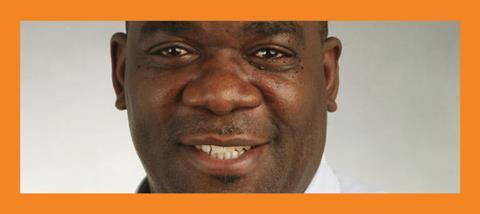Rev Les Isaac OBE founded Ascension Trust 25 years ago, expanding from schools’ work into Street Pastors and numerous other initiatives. Deputy editor Emily Howarth, spoke to him about what he has learned over the years

Emily Howarth: How did you come to faith?
Les Isaac: I grew up in church and Sunday school in Antigua and here. There was more life in my local cemetery than in my church! It was just boring. I had to go because of my parents, but the moment I came of age I totally dismissed it. There were so many other things fighting for my mind and heart, and those things were relevant to me.
In the 60s racism was prevalent. People called me names on the street. We had problems in school because of teachers who were racist. We had problems with the police. I thought: “How come the Jesus I worship looks like the people who hate me?” And there was no one to answer that question.
I remember turning my back on Christianity and this blond-haired, blue-eyed Jesus. I wanted a God that looked like me. When I looked at people like [proponent of Black nationalism] Marcus Garvey, 70s Rastafarianism was there and it said: “You are black; be proud of it.” They helped us to identify with scripture, my identity and my suffering far more than the Church. So I gravitated towards that, dismissed Jesus and began to worship a man called Selassie. In my church and community, if you were a Rasta you’d totally blown it. My parents really wanted to disown me.
I met a guy from Africa who took time and spoke to me about a Jesus who transcended my race. He got to the heart of the gospel. He said he was a suffering Jesus, and felt all I was going through. He went far beyond the blackness, our history and Africa. He was a Jesus who could redeem your soul. That was powerful. I’d not heard that before. I remember saying to God: “I don’t believe in this white man Jesus, but if you’re real, help me.” And that was it! My ganja went, my dreadlocks went.
EH: What have you learnt from your experience?
LI: I think the Church doesn’t do justice to the gospel, largely. We talk about Jesus in some mediocre way. We talk about the gospel as if it was only in the 1st Century. We don’t really talk about the power that changes lives. Just this morning I met a guy. While his parents were in church he was selling drugs out of their attic. God spoke to him, showed him in a dream that he would kill someone if he carried on down this road. He had this encounter with God and his life totally changed. That’s the power of the gospel.
EH: How do we stay relevant?
LI: We need to rediscover how to pray and the God-given anointing that he gave to his disciples in the upper room. As I say to the Street Pastors: “Has God called you to mop up the sick or put a drunk girl in a taxi? Anyone could do that. But if God’s called us to do that and bring in his kingdom, that’s the gospel.”
Unless the Church has a ministry that is not only on a Sunday morning it will fail to reach young people
EH: How do we adapt and innovate?
LI: It’s seeing where the finger is on the pulse. I’ve been in Lambeth for years. Lambeth has high teenage pregnancy, high mental health problems, high gang involvement, a high number of people sent to jail. You name it, it’s high. So I looked at what had been done. There are a lot of people in Lambeth doing things, but actually there’s not joined-up thinking. Churches want to do things, but if they get a youth worker it’s to work with their young people. But that can’t be right. Yes, let’s engage young people, but let’s do 60 per cent on the street and 40 per cent church kids. So the Methodist church said they’ve got a building and London City Mission said: “Let’s see what we can do.” Let’s work with that and admit we can’t do this on our own. For me it’s trying to understand what’s happening and how best we can do it. It’s about: what is God doing and saying? And if you get that you’ll always come up with something relevant.
EH: What do you think needs to be done about knife crime?
LI: It’s complex, there’s not one straightforward answer. We’ve got to educate, but we’ve got to help families. There are children in primary schools that we know are going to carry a knife and have the potential to kill when they are in their teens. We need to do more targeting of families. How do we support a mum who is at home if we all know that her child has the potential to become a killer? We also know that if the child’s father is a killer there’s an over 70 per cent chance they will be too. We’re not tackling the issue; we’re waiting until that child hits the system: probation, social services, prison. We now need to spend 40-odd thousand pounds keeping that person in jail, but we’re not willing to spend £20,000 to keep them out.
I think a lot of schools are in denial. They put up their defences and say they haven’t got a problem. I was in a meeting with heads of authorities and they were saying how difficult it is to get into some schools. It’s about relationship, because obviously teachers don’t want cowboys coming into their schools. And I think it’s about: how do we take time to build confidence with the local schools?
EH: How can we work better with secular organisations?
LI: I think a lot of people have this stereotyped image that all Christians want to do is beat people around the head with a Bible. People need to understand that as the Church we’re passionate about education, social deprivation, families, mental health, employment. That’s the kingdom. That’s the gospel. It’s holistic. So I think unless the Church has a ministry that is not only on a Sunday morning it will fail to reach young people. It will fail to plan for them and fail to make any difference in society.
For me, when I meet with police or the council, I say we’re concerned about the cause of crime and the reduction of crime. We’re concerned about our young people not going to prison, but finding their full potential and contributing to society. So how can we partner together to do that?
We very clearly say our faith is part of who we are, it’s in our DNA. But we’re still human. We’re still concerned parents. We pay our community tax. We’re still passionate about our school. So they need to be reassured we’re not ‘nutters’.
EH: What about the long haul?
LI: When I was a kid, I used to go to a Christian camp. There was an old guy there with a little cigar and he taught me to play snooker. I went there once a year for three years, and all he did was teach me how to play. I still remember that guy. We used to call him Pops.
When you go to school you strike up relationship. I say to schools’ and youth and children’s workers: “Don’t get discouraged; let’s not be weary of doing good. You are sowing seeds. You and I will never know the outcomes until we meet Jesus.”
EH: What do you see in this generation?
LI: I think we sometimes underestimate the intelligence of young people. Yes, they’re bombarded and feel urged to keep in touch with what’s going on. But actually there are a lot of deep-thinking young people who really want relationships. They want people in their lives who are going to be consistent. I believe part of the reason kids are on their phones is because people aren’t talking. For me, this generation is saying: “I’ve got questions that need answering.” And part of that’s been played out in their constant Googling. So I’m asking: “Who is going to sit down with these young people and have a chat?”
EH: How do you make time to do all that you do?
LI: I’ve learned to empower people, so I don’t do everything. My priority is to pray and think about the big picture. Get the people who are passionate and creative to do the thing. My thing is to give myself to prayer and the word of God, and hear what God is saying.
Premier has launched an initiative to encourage people to pray for our young people around issues like knife crime. Visit peaceonourstreets.org.uk for free resources and prayer pointers.










































